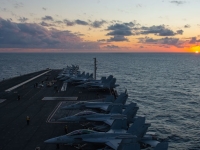Politics
Europe warns Russia as NATO prepares
Crisis on the Ukrainian border
USPA NEWS -
European Council has approved conclusions on the European security situation, asserting that European security is indivisible and that any challenge to the European security order affects the security of the EU and its member states. Meanwhile, NATO prepares for deterrence.
In its conclusions, the Council condemns Russia’s continued aggressive actions and threats against Ukraine, and it calls on Russia to de-escalate, abide by international law and engage constructively in dialogue through the established international mechanisms. As stated by the EU heads of state and government at the European Council meeting in December 2021, “any further military aggression by Russia against Ukraine will have massive consequences and severe costs,” said the European Council.
The EU confirms its “unwavering support for the independence, sovereignty and territorial integrity of Ukraine and other Eastern Neighbourhood partners within their internationally recognised borders, and it calls on Russia to re-engage constructively in existing international frameworks for the sustainable and peaceful resolution of conflicts.”
The Council “reaffirms the united approach of the EU and the ongoing strong cooperation and coordination with the United States, NATO, Ukraine and other partner countries.” It reiterates “the importance of further strengthening the resilience and response capabilities of the EU and its close partners, including in countering cyber and hybrid attacks, foreign information manipulation and interference, including disinformation.”
NATO prepares
In the past days, a number of Allies have made announcements regarding current or upcoming deployments. Denmark is sending a frigate to the Baltic Sea and is set to deploy four F-16 fighter jets to Lithuania in support of NATO’s long-standing air-policing mission in the region. Spain is sending ships to join NATO naval forces and is considering sending fighter jets to Bulgaria. France has expressed its readiness to send troops to Romania under NATO command. The Netherlands is sending two F-35 fighter aircraft to Bulgaria from April to support NATO’s air-policing activities in the region, and is putting a ship and land-based units on standby for NATO’s Response Force. The United States has also made clear that it is considering increasing its military presence in the eastern part of the Alliance.
NATO Secretary General Jens Stoltenberg said: “I welcome Allies contributing additional forces to NATO. NATO will continue to take all necessary measures to protect and defend all Allies, including by reinforcing the eastern part of the Alliance. We will always respond to any deterioration of our security environment, including through strengthening our collective defence.”
NATO is a defensive Alliance. In response to Russia’s illegal annexation of Crimea in 2014, NATO increased its presence in the eastern part of the alliance, including with four multinational battlegroups in Estonia, Latvia, Lithuania and Poland. These units, led by the United Kingdom, Canada, Germany and the United States respectively, are multinational, and combat-ready. Their presence makes clear that an attack on one Ally will be considered an attack on the whole Alliance. There were no NATO forces in the eastern part of the Alliance before 2014.
Liability for this article lies with the author, who also holds the copyright. Editorial content from USPA may be quoted on other websites as long as the quote comprises no more than 5% of the entire text, is marked as such and the source is named (via hyperlink).






